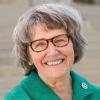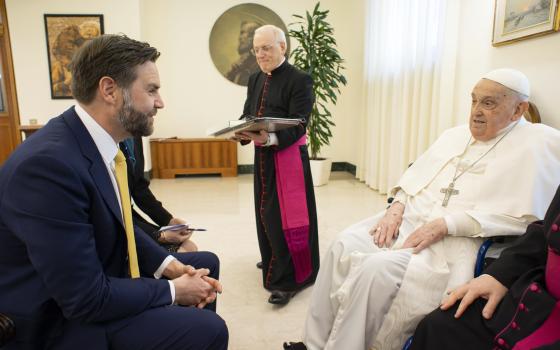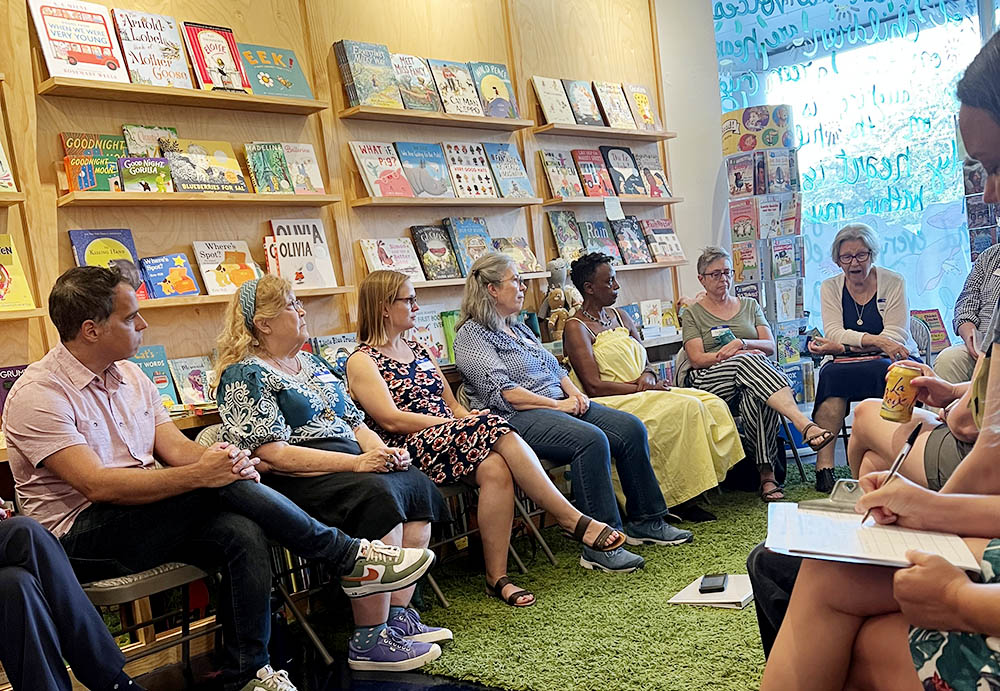
A conversation group at Thank You Bookshop in Birmingham, Alabama. Among other topics, participants spoke about how the city is looking to the future, counting on the University of Alabama, particularly its medical school, to help turn the city around. (Courtesy of Simone Campbell)
In this moment in our nation and world, we are highly divided and often tempted to see the "other" as the enemy. We see the Israel-Hamas power struggle in which the Palestinians are being decimated. We see the gridlock in Congress. We see the division in our Catholic faith between the Pope Francis Catholics and others.
It recently dawned on me that my hunger for building bridges in our politically divided nation is the fruit of the Spirit. I have a meditation practice that is at the heart of my being. I know in my very core that all of creation is one body.
Knowing that we are one body leads me to know that I can leave no one out of my care — even if I disagree with them. When I lobbied with Network Lobby for Catholic Social Justice in Washington, D.C., I always tried to hold a heart of compassion for those I was lobbying — even if I dramatically disagreed with them.
This compassion led me to find Michael Ventura, Keith Magee and Greg Schultz, who also seek to bridge divides in various ways. Michael works with industry, Greg with the political reality, Keith in the academic world, and I try hands-on small-group conversations. We share the desire to depolarize our national reality and seek others to do so through a new organization: Understanding US.
Our idea was to recruit three or four conservatives to join our leadership group to build an organization that demonstrated the bridge-building we are seeking. I attempted to recruit conservatives from the faith community. I was unsuccessful. No conservative I asked felt that he could be "public." Each admitted that they could talk with me, but doing more was not helpful to them and sometimes even dangerous.
If I want to 'bridge divides,' maybe I should start with the divides within myself.
While my colleagues continue their work in different sectors, I felt the need to rethink my strategy if I was going to create dialogue for people with different perspectives. If I could not get conservatives to join our project, then what could I do to re-weave the fabric of our society myself?
When I looked at a map of the United States, I realized that I did not know the South. More than that, the South made me nervous.
I grew up in the time of the civil rights struggle and I saw televised footage of Sheriff Bull Connor, an ardent segregationist in Birmingham, Alabama, turning fire hoses on children. I saw the National Guard protecting Black students in Little Rock from angry mobs as schools were desegregated. I feared both the culture and the history of the South.
So, I said to myself, if I want to "bridge divides," maybe I should start with the divides within myself. Why don't I go to the South and learn about this reality?
This led to two weeks driving through the South being open to learning and discovery.
I reached out to independent bookstores and asked if I could do an "author event" at their store that they would promote. While using my two books as a connection to the bookstores, it was my goal to have the participants educate me about their city and experience of being in the South.
I asked my friends to let their friends in the South know that I was coming to their area. In the process I discovered that only two of my friends have friends in the South! For me it was another sign of what I came to think of as "the Big Divide."
Advertisement
The richness of the trip through eight states and 10 towns opened my eyes to a section of the country that I too often write off. Let me share with you some of my learning.
I learned that, in the South, when you meet someone, the first questions are "Who are your people?" and "What church do you go to?"
Many people who came to the bookstore events were proud of their multigenerational roots in the South. In Birmingham, one person said that her family had been in Alabama for at least nine generations!
There were a couple of exceptions to this reality in the "South." Huntsville, Alabama, and Bentonville, Arkansas, have people moving in at a rapid rate. This is due to local industry: Huntsville is the space industry and Bentonville is Walmart, Tyson and J.B. Hunt and allied suppliers.
The people at the Bentonville gathering were rather surprised to admit that the two "Southern questions" that they readily identified with were no longer asked in town. The younger participants didn't know people who went to church! It was now expected that people were from "outside."
One older man lamented that he could no longer see the landmarks from his childhood as everything is being bulldozed and built over.
In Cookeville, Tennessee, the participants were eager to tell me how Tennessee is the "Volunteer State" and they were so proud of how people volunteer to take care of their neighbors. This works very well when there is a natural disaster, such as the tornado that struck three years before.
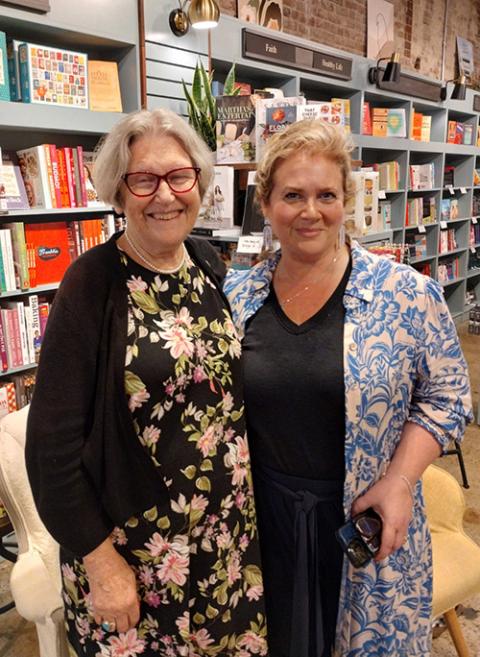
Lisa Uhrick and Sr. Simone Campbell at Plenty Downtown Bookshop in Cookeville, Tennessee, one of the stops along Campbell's "tour of the South" (Courtesy of Simone Campbell)
However, toward the end of the meeting, the participants started lamenting the state of health care in their community. There is a six- or seven-month wait to get pediatric physical therapy, to say nothing of a doctor visit. People talked about the importance of their local hospital, but also of the economic struggle it is having.
I know that part of that economic struggle is caused by Tennessee's refusal to accept Medicaid expansion under the Affordable Care Act. The participants did not make this connection, but I did.
As I have reflected on this Tennessee experience, I have thought that too often we get into an "either/or" mindset. It is true that Tennessee is the "Volunteer State" but ordinary community volunteers can't provide health care!
Rather what is called for is a "both/and" approach. Let's volunteer where we can and then have other systems/programs where volunteering will not work.
But politicians tend to draw extremes to make their point. They would rather say either all volunteers or government programs. I learned that "we the people" need to focus on "both/and" if we are going to heal our society.
In Bentonville, Arkansas, and Tulsa, Oklahoma, I learned that government is not considered a factor in "getting something done." Rather, if you want to get something done you have to interest a local philanthropist.
Walmart has made the Walton family extremely rich in Bentonville and oil has made several extremely wealthy in Tulsa. This wealth is so big that the expectation is that government does not need to be involved. This works for the community around Tulsa and northwest Arkansas, but doesn't do much to alleviate poverty in the rest of the state.
One example I was given of philanthropic activity in Tulsa, recounted to me by a recipient, is that a major donor is giving $3,000 to any 20-something-year-old who stays in Tulsa. The brain drain is worrying him as young people migrate north.
Columbus, Mississippi, surprised me with the way education continues in much of the South. The participants explained that there are the "segregation academies" (white private schools set up to avoid integration) and the "public schools" (principally Black schools). Participants spoke of how "segregation academies" were assumed to be "good schools" because they were white.
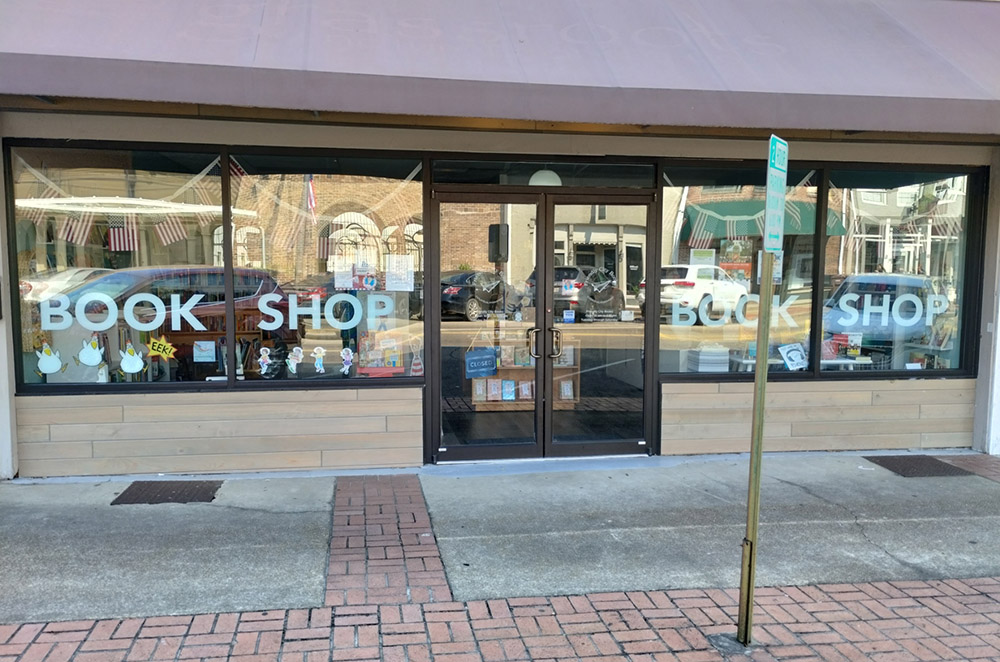
Friendly City Books in Columbus, Mississippi, one of 10 towns in eight states that Campbell visited and held conversations with local residents during her recent "tour of the South" learning adventure. (Courtesy of Simone Campbell)
However, one participant at the bookstore gathering recounted how, after 20 years teaching in a "segregation academy," she came to teach in the public school. She is now talking to friends from her former school about how great it is to teach in these public schools.
Several others explained that some of the public schools were actually quite well respected even though they would not be regarded as "good schools" in the general community. These public schools are not considered "good" because mostly Black students attend.
Perhaps one of my biggest learnings was the importance of leadership. This insight started in Spartanburg, South Carolina, where participants at the book event explained the devastating impact of the collapse of the textile industry in the 1990s. Spartanburg lost its life blood. However, they cited the importance of visionary leadership that re-created the community.
The mayor and others led the reimagining of the city. This reimagining built on the colleges in the community and recruited the tech industry as well as artists into town. Residents said this has re-created the city in just 20 years.
Birmingham residents talked about their own efforts at reimagination. The participants pointed out that Birmingham and Atlanta were the same size in the 1950s and 1960s. However, Atlanta had visionary leadership that courted the film industry and the Olympics. This created a huge boom in Atlanta while Birmingham stayed static.
Birmingham is now working on its own "look to the future." It is counting on the University of Alabama (especially its medical school) in downtown Birmingham to turn the city around. People seemed to be hungry for this growth.
Let us all open our hearts to the unknown and see how we each might reweave our small corner of society.
Mississippi was an entirely different story. It is the only state in the Sunbelt to lose population between the censuses in 2010 and 2020. As people talked about their reality, it seemed that government leadership had no imagination about the future. The focus is on the past and continued hurts and slights from the North.
I realized that those of us who have been advocating for Medicaid expansion in Mississippi had been focusing on "Your people need it." This does not touch the reason the state government is not accepting Medicaid. Rather, I came to realize that for them to accept a federal program would be to surrender "states rights" and succumb to the "war of Northern aggression" (as they describe the Civil War).
With government leaders focused on the hurts of the past it is impossible to imagine a creative future.
It should also be noted that Mississippi has one of the most regressive tax systems in the country. Their principal source of revenue is sales tax. There is a 7% sales tax on groceries and a 9% tax on prepared food.
Advocates told me that the legislature thinks this is okay because for those low-income families that receive food stamps this is just federal money paying state taxes and does not really harm anyone. I found myself horrified.
I could go on, but let me summarize by saying that my meditation/contemplative practice lured me to open my heart to a reality beyond my experience. I learned in the process that we need to be adventurers to create healing in this divided world.
As we begin to move into our Advent time, let us all open our hearts to the unknown and see how we each might reweave our small corner of society. We are called to be missionaries of healing and understanding in challenging times.
